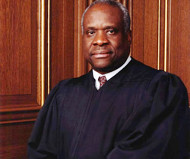3/8/2017
Supreme Court Justice Slams Civil ForfeitureJustice Clarence Thomas questions the constitutionality of taking property from motorists with civil procedures.

The idea that the government can take away someone's car or cash without due process offends at least one member of the US Supreme Court. In a statement Monday, Justice Clarence Thomas called on his colleagues to revisit civil asset forfeiture, the process that allows prosecutors to go after assets allegedly linked in some way to a crime. The justice argued the system has been widely abused.
"Civil proceedings often lack certain procedural protections that accompany criminal proceedings, such as the right to a jury trial and a heightened standard of proof," Justice Thomas explained. "Partially as a result of this distinct legal regime, civil forfeiture has in recent decades become widespread and highly profitable. And because the law enforcement entity responsible for seizing the property often keeps it, these entities have strong incentives to pursue forfeiture."
Justice Thomas cited the example of speed traps in Tenaha, Texas where officers would stop out-of-town black and Latino drivers and coerce them into signing over their car or cash to avoid the filing of felony charges. Tenaha raised $3 million from people passing through the town over two years.
"These forfeiture operations frequently target the poor and other groups least able to defend their interests in forfeiture proceedings," Justice Thomas wrote. "Perversely, these same groups are often the most burdened by forfeiture. They are more likely to use cash than alternative forms of payment, like credit cards,which may be less susceptible to forfeiture. And they are more likely to suffer in their daily lives while they litigate for the return of a critical item of property, such as a car or a home."
The Supreme Court allows civil forfeiture citing laws that stretch back to the first Congress giving customs officials the authority to seize pirate ships and contraband cargo under the fiction that the property itself was guilty of a crime, not its owner.
"I am skeptical that this historical practice is capable of sustaining, as a constitutional matter, the contours of modern practice," Justice Thomas wrote. "First, historical forfeiture laws were narrower in most respects than modern ones."
The pirate ship's owner could not be hauled into court because he was usually found overseas, for example. The laws also went after the ship, but not the property a pirate may have purchased with the booty -- as modern laws allow. The old laws also maintained more due process protections.
Justice Thomas made his observations in the case of Lisa Olivia Leonard who was stopped in the notorious speed trap town of Cleveland, Texas on April 1, 2013 for allegedly driving 71 MPH in a 65 zone. The officers on the scene took $201,100 in cash she had in a safe, alongside a bill of sale for a house. For procedural reasons, the high court turned down Leonard's appeal, but Justice Thomas is looking forward to the opportunity of revisiting the forfeiture issue.
"Whether this court's treatment of the broad modern forfeiture practice can be justified by the narrow historical one is certainly worthy of consideration in greater detail," Justice Thomas concluded.
Justice Thomas has a long record of upholding the rights of motorists. In 2000, he questioned the constitutionality of drunk driving roadblocks.
"I rather doubt that the framers of the Fourth Amendment would have considered 'reasonable' a program of indiscriminate stops of individuals not suspected of wrongdoing," Justice Thomas wrote in Indianapolis v. Edmond.
A copy of the statement is available in a 75k PDF file at the source link below.


